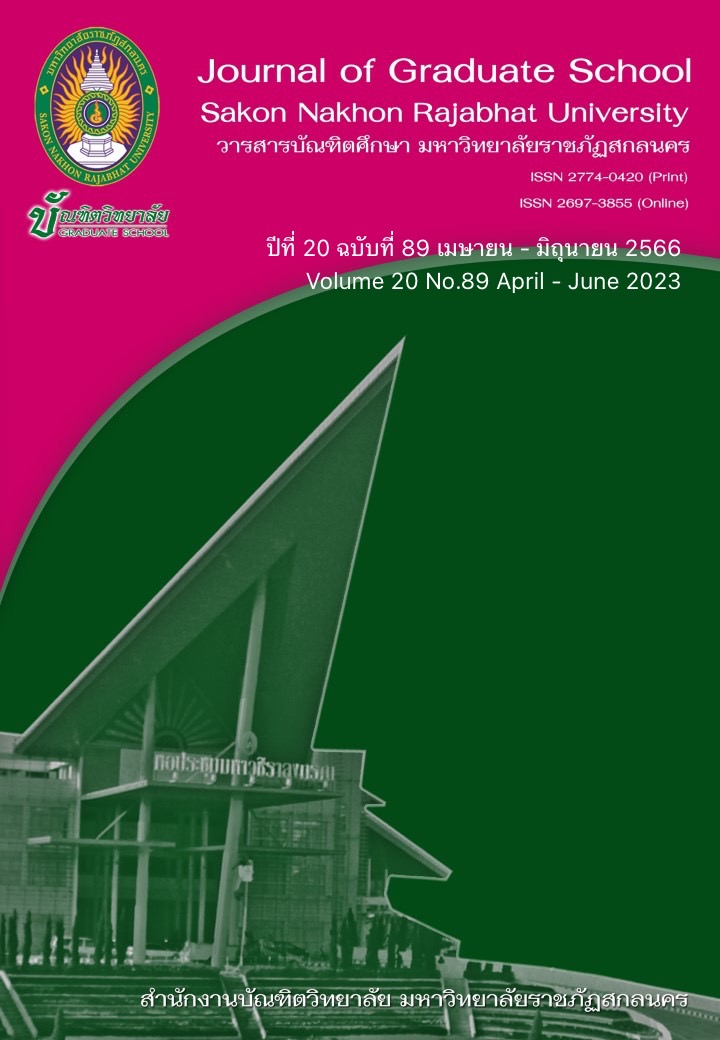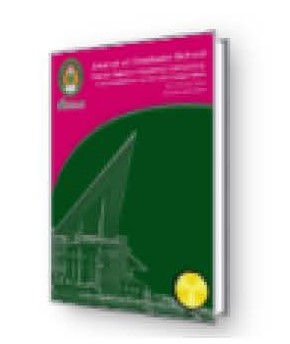การพัฒนาทักษะกระบวนการทางวิทยาศาสตร์และความสามารถในการคิดอย่างมีวิจารณญาณ ของนักเรียนชั้นมัธยมศึกษาปีที่ 3 โดยใช้การจัดการเรียนรู้แบบวัฏจักรการเรียนรู้ 7 ขั้น (7E) ร่วมกับการใช้ผังกราฟิก
คำสำคัญ:
วัฏจักรการเรียนรู้ 7 ขั้น, ผังกราฟิก, ทักษะกระบวนการทางวิทยาศาสตร์, การคิดอย่างมีวิจารณญาณบทคัดย่อ
การวิจัยครั้งนี้มีวัตถุประสงค์เพื่อ 1) พัฒนาทักษะกระบวนการทางวิทยาศาสตร์ ของนักเรียนชั้นมัธยมศึกษาปีที่ 3 โดยใช้การจัดการเรียนรู้แบบวัฏจักรการเรียนรู้ 7 ขั้น (7E) ร่วมกับการใช้ผังกราฟิก ให้นักเรียนมีคะแนนทักษะกระบวนการทางวิทยาศาสตร์เฉลี่ยไม่น้อยกว่าร้อยละ 70 ของคะแนนเต็มและมีจำนวนนักเรียนผ่านเกณฑ์ไม่น้อยกว่าร้อยละ 70 ของจำนวนนักเรียนทั้งหมด 2) พัฒนาความสามารถในการคิดอย่างมีวิจารณญาณของนักเรียนชั้นมัธยมศึกษาปีที่ 3 โดยใช้การจัดการเรียนรู้แบบวัฏจักรการเรียนรู้ 7 ขั้น (7E) ร่วมกับการใช้ผังกราฟิก ให้นักเรียนมีคะแนนความสามารถในการคิดอย่างมีวิจารณญาณเฉลี่ยไม่น้อยกว่าร้อยละ 70 ของคะแนนเต็มและมีจำนวนนักเรียนผ่านเกณฑ์ไม่น้อยกว่าร้อยละ 70 ของจำนวนนักเรียนทั้งหมด กลุ่มเป้าหมาย คือ นักเรียนชั้นมัธยมศึกษาปีที่ 3/1 จำนวน 15 คน รูปแบบการวิจัยเชิงปฏิบัติการ จำนวน 3 วงจร เครื่องมือที่ใช้ในการปฏิบัติการวิจัย คือ 1) แผนการจัดการเรียนรู้แบบวัฏจักรการเรียนรู้ 7 ขั้น (7E) ร่วมกับการใช้ผังกราฟิก จำนวน 6 แผน เวลา 18 ชั่วโมง เครื่องมือที่ใช้ในการสะท้อนผลการวิจัย ได้แก่ 1) แบบบันทึกผลการจัดการเรียนรู้ 2) แบบสังเกตการจัดการเรียนรู้ 3) แบบสัมภาษณ์นักเรียนและแบบทดสอบท้ายวงจร เครื่องมือที่ใช้ในการประเมินผลการวิจัย ได้แก่ 1) แบบทดสอบทักษะกระบวนการทางวิทยาศาสตร์ จำนวน 12 ข้อ 2) แบบทดสอบความสามารถในการคิดอย่างมีวิจารณญาณ จำนวน 35 ข้อ สถิติที่ใช้ในการวิเคราะห์ข้อมูล ได้แก่ ค่าเฉลี่ย ส่วนเบี่ยงเบนมาตรฐาน และค่าร้อยละ แล้วนำคะแนนมาเทียบกับเกณฑ์เป้าหมายที่ตั้งไว้ วิเคราะห์ข้อมูลเชิงคุณภาพโดยการวิเคราะห์เนื้อหา
ผลการวิจัย พบว่า
1. นักเรียนมีคะแนนทักษะกระบวนการทางวิทยาศาสตร์เฉลี่ยเท่ากับ 17.93 ส่วนเบี่ยงเบนมาตรฐาน 2.69 คิดเป็นร้อยละ 74.71 ของคะแนนเต็ม และมีนักเรียนที่ผ่านเกณฑ์ จำนวน 11 คน คิดเป็นร้อยละ 73.33 ของจำนวนนักเรียนทั้งหมดซึ่งสูงกว่าเกณฑ์ที่กำหนดไว้
2. นักเรียนมีคะแนนความสามารถในการคิดอย่างมีวิจารณญาณเฉลี่ยเท่ากับ 25.93 ส่วนเบี่ยงเบนมาตรฐาน 2.91 คิดเป็นร้อยละ 74.09 ของคะแนนเต็ม และมีนักเรียนที่ผ่านเกณฑ์ จำนวน 12 คน คิดเป็นร้อยละ 80.00 ของจำนวนนักเรียนทั้งหมด ซึ่งสูงกว่าเกณฑ์ที่กำหนดไว้
เอกสารอ้างอิง
กระทรวงศึกษาธิการ. (2551). หลักสูตรแกนกลางการศึกษาขั้นพื้นฐาน พุทธศักราช 2551. กรุงเทพฯ: โรงพิมพ์คุรุสภา ลาดพร้าว.
________. (2560). ตัวชี้วัดและสาระการเรียนรู้แกนกลางกลุ่มสาระการเรียนรู้วิทยาศาสตร์ (ฉบับปรับปรุง พ.ศ. 2560). กรุงเทพฯ: โรงพิมพ์ชุมนุมสหกรณ์การเกษตรแห่งประเทศไทย จำกัด.
เกียรติพล กุสุมาลย์ และไพโรจน์ เติมเตชาติพงศ์. (2560). ความสามารถในการคิดอย่างมีวิจารณญาณและผลสัมฤทธิ์ทางการเรียน เรื่อง สิ่งมีชีวิตกับสิ่งแวดล้อมของนักเรียนชั้นประถมศึกษาปีที่ 6 โดยการจัดการเรียนรู้แบบวัฏจักรการเรียนรู้ 7 ขั้น. วารสารศึกษาศาสตร์ ฉบับวิจัยบัณฑิตศึกษา มหาวิทยาลัยขอนแก่น, 11(2), 10-21.
นิตยา ม่วงพะเนาว์ และวาสนา กีรติจำเริญ. (2561). ผลสัมฤทธิ์ทางการเรียนและความสามารถในการคิดอย่างมีวิจารณญาณ ของนักเรียนชั้นมัธยมศึกษาปีที่ 5 จากการจัดการเรียนรู้แบบสืบเสาะหาความรู้ (7E) ร่วมกับผังมโนทัศน์. วารสารวิทยบริการ มหาวิทยาลัยสงขลานครินทร์, 29(3), 40-49.
ฑิฆัมพร กอมณี. (2556). การเปรียบเทียนผลสัมฤทธิ์ทางการเรียนวิชาฟิสิกส์ เรื่อง แสงและทัศนอุปกรณ์ และทักษะกระบวนการทางวิทยาศาสตร์ ของนักเรียนชั้นมัธยมศึกษาปีที่ 5 ระกว่างการจัดการเรียนรู้แบบวัฏจักรการเรียนรู้ 7 ขั้น และดำเนินการจัดการเรียนรู้แบบใช้ปัญหาเป็นฐาน. วิทยานิพนธ์ กศ.ม. มหาสารคาม: มหาวิทยาลัยมหาสารคาม.
พิมพันธ์ เดชะคุปต์. (2545). พฤติกรรมการสอนวิทยาศาสตร์. กรุงเทพฯ: พัฒนาคุณภาพวิชาการ (พ.ว.).
วรรณทิพา รอดแรงค้า และพิมพันธ์ เดชะคุปต์. (2542). การพัฒนาการคิดของครู ด้วยกิจกรรมทักษะกระบวนการทางวิทยาศาสตร์. กรุงเทพฯ: สถาบันพัฒนาคุณภาพวิชาการ.
วรุณีพร ขวัญโพก และน้ำฝน เบ้าทองคำ. (2563). การพัฒนาผลสัมฤทธิ์ทางการเรียนและทักษะกระบวนการทางวิทยาศาสตร์ขั้นบูรณาการของนักเรียนชั้นมัธยมศึกษาปีที่ 2 เรื่อง ดิน โดยใช้วิธีการจัดการเรียนรู้แบบโครงงานเป็นฐาน. วารสารครุศาสตร์สาร, 14(1), 159-172.
วันทนา งาเนียม และพรสิริ เอี่ยมแก้ว. (2564). ผลการจัดการเรียนรู้แบบสืบเสาะหาความรู้ที่มีต่อทักษะกระบวนการทางวิทยาศาสตร์ของนักเรียนชั้นมัธยมศึกษาปีที่ 5. วารสารบัณฑิตวิจัย, 12(1), 55-67.
สถาบันทดสอบการศึกษาแห่งชาติ. (2564). ระบบประกาศและรายงานผลสอบโอเน็ต. เข้าถึงได้จาก http://www.newonetresult.niets.or.th/AnnouncementWeb/Login.aspx. 18 เมษายน 2564.
สถาบันส่งเสริมการสอนวิทยาศาสตร์และเทคโนโลยี. (2561). คู่มือการใช้หลักสูตรรายวิชาพื้นฐานวิทยาศาสตร์. เข้าถึงได้จาก https://so05.tcithaijo.org/index.php/DPUSuthiparithatJournal/issue/view/16611/3936. 9 เมษายน 2564.
สิทธิพล อาจอินทร์. (2550). รูปแบบการพัฒนาทักษะการสอนคิดอย่างมีวิจารณญาณ สำหรับครูวิทยาศาสตร์ประถมศึกษา. วิทยานิพนธ์ ศษ.ด. ขอนแก่น: มหาวิทยาลัยขอนแก่น.
สุภัทรา ตันติวิทยมาศ. (2554). การพัฒนาทักษะการแก้ปัญหาอย่างมีวิจารณญาณด้วยแผนผังมโนทัศน์ของนักเรียน ระดับชั้นมัธยมศึกษาปีที่ 2. วิทยานิพนธ์ ค.ม. กรุงเทพฯ: จุฬาลงกรณ์มหาวิทยาลัย.
สุวัฒน์ นิยมค้า. (2531). ทฤษฎีและทางปฏิบัติในการสอนวิทยาศาสตร์แบบสืบเสาะหาความรู้. กรุงเทพฯ: เจเนอรัลบุ๊คเซ็นเตอร์.
อำนาจ เจริญศิลป์. (2537). วิธีการสอนวิทยาศาสตร์ยุคใหม่. กรุงเทพ: โอเอสพริ้นติ้งเฮ้าส์.
Bantalem, W., & Kassie, B. (2020). Effects of using inquiry-based learning on EFL students’ critical thinking skills. Asian-Pacific Journal of Second and Foreign Language Education, 5(9), 1-14.
Bromley K., Linda D., & Modlo, M. (1995). Graphic Organizers: Visual Strategies for Active Learning. New York: Scholastic Professional Books.
Carol, E. Watson. (2005). Graphic Organizers: Toward Organization and Complexity of Student Content Knowledge. Ph.D. Dissertation Virginia: Virginia Polytechnic Institute and State University.
Christopher, M. Longo. (2012). Effects of an Inquiry-Based Science Program on Critical Thinking, Science Process Skills, Creativity, and Science Fair Achievement of Middle School Students. Ph.D. Dissertation Connecticut: Western Connecticut State University.
Eisenkraft. (2003). Expanding the 5E Model: A Proposed 7E Model Emphasizes Transferring Learning and the Importance of Eliciting Prior Understanding. The Science Teacher, 70(6), 56-59.
Kemmis, S., & McTaggart, R. (1988). The Action Research Planner. Geelong, Australia: Deakin University Press.
Khairani, N., & Bukit.(2021) . Analysis of Science Process Skills Using Learning Cycle 7E. Journal of Physics: Conference Series Bristol, 1811(1), 1-5.
OECD. (2013). Education at a Glance 2013: OECD Indicators. Retrieved form https://www.oecd.org/education/eag2013%20(eng)--FINAL%2020%20June%202013.pdf. April 9th, 2021.
ดาวน์โหลด
เผยแพร่แล้ว
รูปแบบการอ้างอิง
ฉบับ
ประเภทบทความ
สัญญาอนุญาต
ลิขสิทธิ์ (c) 2023 วารสารบัณฑิตศึกษา มหาวิทยาลัยราชภัฏสกลนคร

อนุญาตภายใต้เงื่อนไข Creative Commons Attribution-NonCommercial-NoDerivatives 4.0 International License.
บทความทุกบทความที่ตีพิมพ์ในวารสารบัณฑิตศึกษา มหาวิทยาลัยราชภัฏสกลนคร ถือว่าเป็นลิขสิทธิ์ของบัณฑิตวิทยาลัย มหาวิทยาลัยราชภัฏสกลนคร






